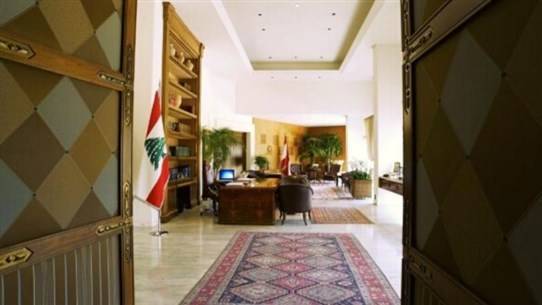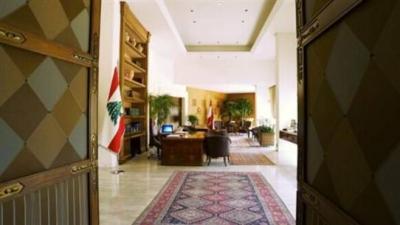Political circles in Lebanon are beginning to brace for the repercussions of the effective management of public facilities if the vacancy in the presidential position exceeds critical limits and continues for an extended period. This would have implications that could heighten the degradation of what remains of the operational administrations and institutions, especially those concerned with security and finance. This situation is prompting the caretaker government to look for temporary solutions to fill the void, particularly following the referral of a proposed expedited law aimed at extending the terms of general directors, introduced by members of the “Democratic Gathering,” to joint parliamentary committees for study.
In this context, the "Middle East" learned that efforts are being made to restore quorum to the military council of the Lebanese army, especially with the upcoming retirement of Chief of Staff Lt. Gen. Amin Aram, followed by his colleagues, the Director of Administration in the military institution, Maj. Gen. Malik Shams, and the Inspector General, Maj. Gen. Milad Isk, all of whom are members of the council. Decisions regarding their replacements will need to be made by the Cabinet, which cannot convene under the current caretaker government conditions.
A ministerial source revealed that there is a possibility to fill the gap in the military council, which consists of five members holding the rank of general, in addition to the army commander, Gen. Joseph Aoun, and cannot convene unless five of its members are present, making decisions by majority, with Gen. Aoun’s vote being the tiebreaker. The minister of defense in the caretaker government, retired Brig. Gen. Maurice Sleiman, could initiate measures to prevent the vacancy in the military council by issuing a decision to postpone the retirement of the three officers until circumstances allow for the Cabinet to appoint their successors. The minister might reference precedents established by the National Defense Law, the last being a decision by the then Vice Prime Minister and Minister of Defense, the late Faysal Ghosn, who postponed the retirement of former army commander Gen. Jean Qahwaji and intelligence director Brig. Gen. Edmond Fadel.
The ministerial source indicated that the decision to delay their retirement rests with Minister Sleiman, who is considered close to former President Michel Aoun, and expressed confidence that he would not hesitate to issue a decision in this regard to ensure the functioning of the military institution during these critical times in Lebanon. The army's role, alongside security forces, is crucial for maintaining civil peace and general stability, given that it acts as a safety valve against the further deterioration of the security situation, akin to the decline already seen in financial, economic, and social conditions in the absence of at least minimal solutions.
It was emphasized that ensuring the regularity of the military institution requires maintaining quorum in the military council, especially as the international community agrees on providing support to it and other security forces, as they represent the necessary reserve to prevent state collapse until the country can emerge from its political crisis, starting with the election of a president for the republic to restore order to constitutional institutions. It is therefore necessary to prevent paralysis in the military council due to the retirement of three of its members.
The military council has the authority to make decisions through the administration of the army regarding all contracts and financial expenditures, whether related to supplying food for the soldiers or meeting healthcare, logistical, and medical needs. Additionally, it plays a role in appointing the head of the military court, promoting officers from the rank of captain and above, appointing brigade and unit leaders, and issuing military formations, as well as opening recruitment for students of the military academy.
As such, extraordinary circumstances justify certain exceptions, and since the National Defense Law permits the Minister of Defense to issue decisions to postpone the retirement of officers, this will inevitably occur and is unlikely to face opposition from any parties, as all sides commend the role of Gen. Aoun and other security leaders.
As for the prolonged presidential vacancy, the caretaker government faces the urgent task of appointing a successor to the Director General of General Security, Maj. Gen. Abbas Ibrahim, who is set to retire in March. Currently, it does not seem feasible to choose his successor since the appointment is within the realm of a fully convened Cabinet, unless the joint parliamentary committees adopt the expedited law proposed by the members of the “Democratic Gathering," headed by MP Taymour Jumblatt, and refer it to the Parliament’s General Assembly for approval during a necessary legislative session, which remains a point of contention among parliamentary blocs prioritizing the election of a president. Gen. Ibrahim’s role extends beyond internal matters due to his extensive Arab and international networks.
Regarding the Central Bank of Lebanon, if the presidential vacancy persists beyond July, which marks the end of the term of Central Bank Governor Riad Salameh, extension options seem unlikely, and his first deputy, Wassim Mansouri, will assume his responsibilities. This situation is complicated by the absence of a representative from the Maronite community, as the acting director of the Ministry of Finance, George Maarawi, cannot participate in meetings due to his acting capacity.
Will efforts be made to resolve the imbalance by filling the presidential vacancy before July, given the central council's role in managing the country's finances? What would be the reaction from the Maronite community if the vacancy persists for an extended period?




